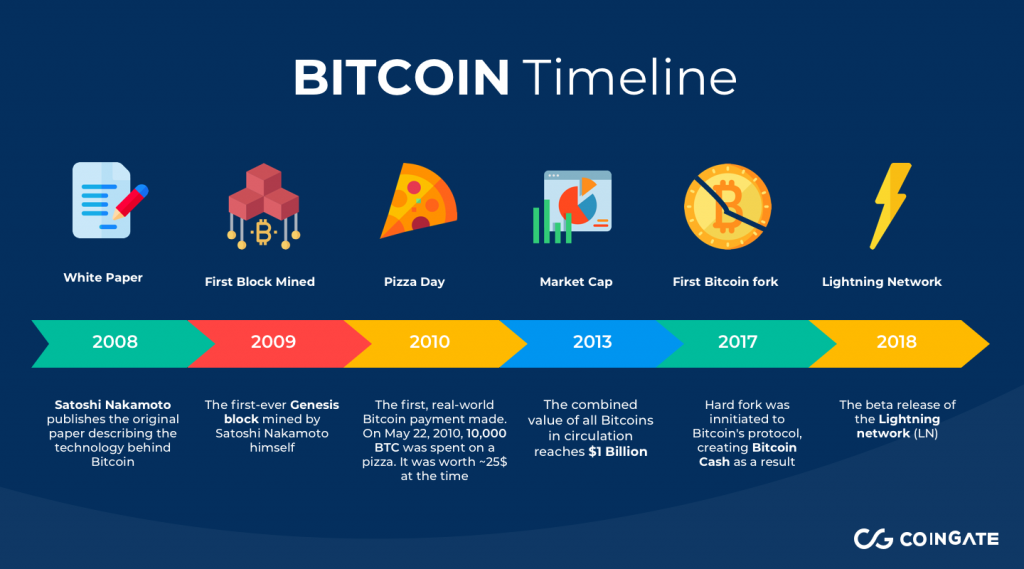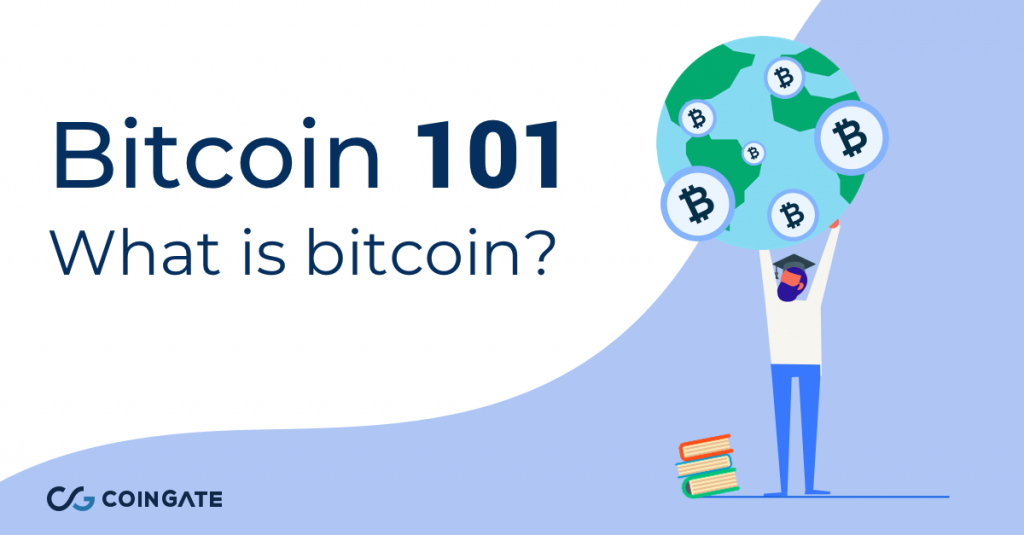
Accept crypto with CoinGate
Accept crypto with confidence using everything you need in one platform.
What is Bitcoin? Introduction to cryptocurrency and blockchain
It is fair to say that everyone heard of Bitcoin, or cryptocurrency by now, in one way or another. If you are reading this, chances are you want to learn even more. However, to understand what exactly it is, and really get into it, you have to endure a steep learning curve.
We are here to walk you through it, whether you want to learn the fundamentals of the blockchain, deepen your current knowledge, find places to talk to the community or just scout for reliable news sources. So, let’s start with the absolute basics, in case you are taking your first steps.
If you are already familiar with Bitcoin and its basic terminology, just skip further ahead.
Crypto terminology: the most common words
When you begin educating yourself, you will often hear words like cryptocurrency, peer-to-peer, blockchain, wallet, mining, exchange, fork, and many more, which you might encounter for the first time, or don’t know the exact meaning of.
Decriptionary is an online dictionary exceptionally committed to the vocabulary of blockchain tech. Hence their list of the 25 most frequent cryptocurrency words is where we advise starting. It covers the most usual terms in-detail, providing clear descriptions and explanations.
Even if you cannot find a word that you are looking for on the list, feel free to use the search feature. Decriptionary provides over 250 definitions, some with illustrations to increase your understanding.
The Bitcoin Whitepaper
Once you grasp the most common terms, you will be prepared to read the most significant, historical piece of work in the crypto world – the original Bitcoin Whitepaper from 2009, written by a mysterious Bitcoin creator known only as Satoshi Nakamoto.
It explains the rules and core principles of Bitcoin, defining what problems the technology could potentially solve. However, be warned that it might be a challenging read. That is why it is necessary to familiarize with the most common terminology prior.
Educational videos on cryptocurrency
Not everyone fancies reading, and sometimes, it is much more convenient to educate yourself by watching some short, quality videos. We took some time to cherry-pick the most useful and easily digestible videos that should broaden your perception of how Bitcoin and cryptocurrencies work in general. So, here we go:
What is Bitcoin?
How Bitcoin Works in 5 Minutes (Technical)
How does a blockchain work – Simply Explained
What is Bitcoin Mining?
What Is A Bitcoin Wallet? – The Best Explanation EVER
Public & Private Keys Explained (Litecoin/Bitcoin)
What is a Bitcoin hard fork? Simply Explained!
Free online courses about Bitcoin
Another way to truly learn something is to take well-crafted lessons and classes. Which way to go – free or paid – entirely depends on the knowledge level you wish to achieve. However, there are plenty of scholarly sources online that offer quality learning material free of charge.
Below, you will find descriptions of the most useful and accurate (free only) learning courses that we recommend.
Khan Academy
Khan Academy offers practice exercises, instructional videos, and a personalized learning dashboard for all kinds of fields. Luckily, the platform stores a video course on Bitcoin, created by Zulfikar Ramzan, the CTO of cyber-security company RSA.
A total of nine Youtube videos, the guide explains the most fundamental aspects of Bitcoin in plain words, including explanations of hash functions, digital signatures, proof of work, and so on. In case you prefer reading a text rather than watching a video, all videos are transcripted to English. Take the course here.
Coursera
Coursera platform offers a course on Bitcoin and cryptocurrency technologies by Princeton University. Overwhelmingly positively rated lessons introduce Bitcoin more on a technical level. The 18-hour lecture includes numerous video lessons, quizzes, and assignments. Upon completion, as its description states, “You should have the conceptual foundations you need to engineer secure software that interacts with the Bitcoin network.” If it’s something you are up for, enroll in the course here.
Udemy
Yet another class on the most crucial Bitcoin fundamentals by professors Charles Hoskinson and Brian Göss. The lesson provides 6 hours on-demand video content, 2 hours on-demand audio material and additional 13 downloadable resources for further education. Once completed, you will also get the certificate of completion.
These courses do not require to have any prior knowledge about Bitcoin at all, and is an excellent start for absolute beginners. Start the course here.
Join the crypto community
In addition to reading and watching videos, it is always beneficial to stay in touch with communities that have a keen interest in the same field. You can often find insightful discussions and the most recent news just by participating in the most active threads. Following the most influential people in the industry might provide you with more valuable knowledge than anyone else.
Moreover, there you can always ask questions or look for solutions to your own problems. More than often, you will get the answer you are looking for.
Suggested websites: r/Bitcoin, BitcoinTalk, Quora.
Cryptocurrency news sources
Keep in mind that there are many great media resources publish updates about Bitcoin and crypto every day. Here are four media outlets that we consider to be an excellent, professional source for all crypto-related news – BitcoinMagazine, CoinDesk, Forbes and TheNextWeb.
One of our favorites is BitcoinMagazine. The extensive copies about the technology and usability of cryptocurrencies from the author Aaron van Wirdum are quite an insightful reads.
If you are up for some easy page-turners, you can find many on Coindesk that highlight the daily events in the crypto industry. However, if you prefer reading the mass media outlets, we recommend an excellent cryptocurrency column on Forbes, lead by Billy Bambrough.
Learn about the Lightning Network

Share this Image On Your Site
Another crucial aspect of understanding Bitcoin is getting familiar with its ongoing development efforts. The Lightning Network (LN), in particular, is one of the most exciting developments in Bitcoin’s history to date. Thus it is necessary to keep up with its progress if you wish to learn everything about what Bitcoin can actually become in the future.
LN is a second-layer protocol for the Bitcoin’s blockchain that provides a long-term scalability solution for faster and cheaper payments. By opening Lightning channels “off-chain”, users are able to transact in high volumes without the need to wait for block confirmations.
It might sound complicated at first, but there is always a simple explanation. The easiest way to learn more about it is by watching a 5 minute Youtube video called “Bitcoin’s Lightning Network, Simply Explained!”. It really simplifies the whole concept by presenting a clear, well-animated example of a real use case. Watch it here:
Another option is more suitable for those who are ready to absorb an enormous amount of information. This extensive Q&A answers pretty much all of the frequently asked questions circulating among the community regarding the LN.
CoinGate also wrote some articles about the LN as we’re one of the first cryptocurrency payment processors in the world that introduced Lightning Network payments to their customers.
Here is our Lightning Network related content:
What is Lightning Network? Intro to LN Payments
How to pay using the Lightning Network
A year of Lightning Network: stats, progress and expectations
Altcoins – what are those?
Worth noting that Bitcoin is not the only cryptocurrency around. As the Bitcoin code is open-source, everyone can make their own version of the blockchain if they have enough skill to do so. Thus, over the years, many projects have surfaced with the same underlying technology that Bitcoin has, striving to surpass its predecessor by offering alternative features and promoting various use-cases.
These are the six most well-known Altcoins that have ongoing developments and active communities supporting them. Litecoin is the crypto asset that came right after Bitcoin, which is known as the lighter version of the Bitcoin blockchain. Ethereum allows creating smart contracts and issuing your own tokens on top of the existing blockchain. TRON is quite similar in nature, but it has even bigger ambitious – decentralization of the whole internet. There are also digital assets like XRP that targets enterprise level consumers, although it can also be used for payments. An excellent example of cryptocurrency created exclusively for payments is Nano which is pre-mined and uses a proof-of-stake consensus model to speed up the network. Also, there is another type of cryptocurrency, better known as a stablecoin. Dai is one of them, keeping the stable value of 1$, backed by users who put their Ethereum for collateral to create its supply.
Conclusion
Hopefully, this article helped you dig out some useful resources and satisfy your curiosity. If you appreciate content like this, we recommend subscribing to our blog. Just enter your email down below, and you will never miss a story from us!
Accept crypto with CoinGate
Accept crypto with confidence using everything you need in one platform.


